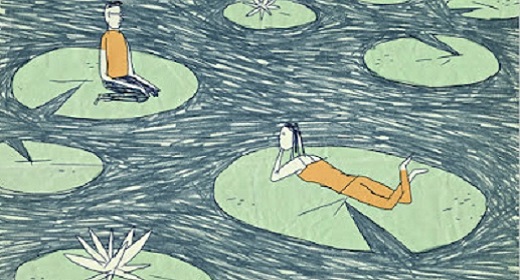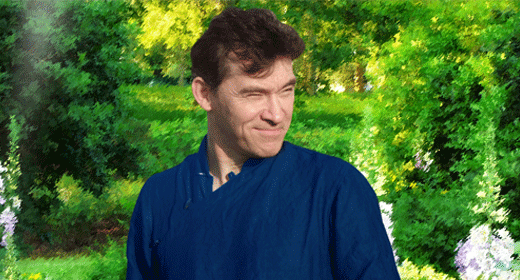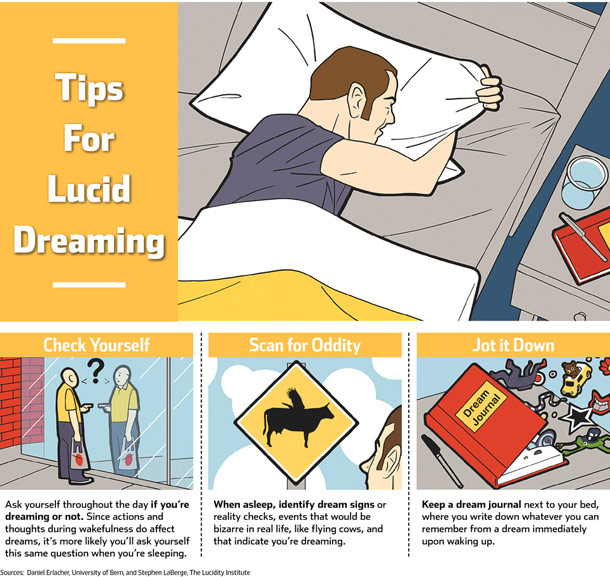Researchers Decipher Clues From Those With Greater Awareness, Control of Behavior in Dreams…
Anthony Bloxham was standing in the garden of his house when he wondered if he was dreaming.
To figure it out, he looked at his hands. Experts in a phenomenon known as lucid dreaming, where sleeping people are aware that they’re in a dream, say dreamers should look for reality checks, or details that look different in dreams than in real life. Indeed, Mr. Bloxham’s hand was glowing yellow, so he realized he was asleep.
Some lucid dreamers are able to control elements of their dreams once they realize they’re dreaming. They do what’s impossible or unlikely in real life, like fly or meet famous people. Mr. Bloxham, 21, a recent university graduate from Mansfield, England, who stumbled onto the concept on the Internet and thought it sounded like fun, recalls the feeling of swimming through the air—though he hasn’t flown, as he’s wanted to.
Others use the technique to solve problems, spur creativity, overcome nightmares or practice a physical skill, says Daniel Erlacher, a professor at the University of Bern’s Institute for Sport Science, who has conducted surveys of lucid dreamers.
Researchers are studying people like Mr. Bloxham to understand if lucid dreaming can improve dreamers’ abilities when they’re awake.
Psychologists at the University of Lincoln in England found in a June study that people with frequent lucid dreams are better at cognitive tasks that involve insight, like problem-solving. Other researchers have shown that people who dream of practicing a routine can improve their abilities in that activity in real life. Early evidence also suggests that lucid dreaming may help improve depressive symptoms and mental health in general, perhaps by giving people a greater sense of self-control.
Many of the studies are small, however, and it isn’t always clear whether lucid dreaming is responsible for the improvements or simply linked to them, experts say. People vary tremendously in how often they remember their dreams, as well as their degree of awareness and control while dreaming.
Most people aren’t aware when they’re dreaming, which tends to occur in a stage known as rapid-eye movement, or REM, sleep. Yet even with the body in a very deep sleep, the mind is very active.
Having awareness during the dream state, and the added ability to control the dream, asportrayed in the movie “Inception,” isn’t a regular occurrence for most people. Surveys suggest that about half of us will have at least one experience in our lifetimes. About 20% or more have routine lucid dreaming experiences, according to studies conducted by Dr. Erlacher and his team in Switzerland.
The plot of the 2010 film “Inception” involves the idea of lucid dreaming. ©Warner Bros/Everett Collection
Lucid dreaming comes more easily to some people, but experts say it can be learned. The low number of people able to lucid dream at will, particularly in a sleep lab, is one of the main challenges with conducting research on the phenomenon. Another obstacle is figuring out when people are actually lucid dreaming, since it isn’t clear whether people’s recollections upon waking are accurate.
Patrick Bourke and Hannah Shaw are researchers from the University of Lincoln, and lucid dreamers themselves. They set out to investigate in their recent study whether frequent lucid dreamers had different ways of thinking while awake, compared with non-frequent lucid dreamers. They hypothesized that awareness while dreaming may be related to those “aha!” moments often necessary in problem-solving. The study was published in Dreaming, a journal of the American Psychological Association, in June.
In the lab, 20 people who say they haven’t had the experience of being aware that they’re dreaming, 28 occasional lucid dreamers and 20 frequent lucid dreamers completed a problem-solving task. They were given three words and had to figure out a word to go with each. For instance, stone pairs up with the trio of age, mile and sand.
The frequent lucid dreamers were significantly better at solving these puzzles than the non-dreamers. The occasional dreamers fell in the middle but weren’t statistically different from either of the other two groups.
Why frequent dreamers showed improved performance wasn’t clear from the study. The authors speculated that the ability to make more remote associations and question unusual details could be more finely honed in the lucid group. The authors don’t know if the lucid dreamers differed from the other groups in terms of intelligence or other cognitive skills.
Other studies looking at different cognitive tasks also suggest that lucid dreamers perform better than non-lucid dreamers.
The University of Bern’s Dr. Erlacher has been curious about the effect of mental practice during dreaming on physical skills. Research in his field has demonstrated that imagining successfully hitting a ball or making a basket can help athletes perform better during competition.
In one small study, published in the journal Sport Psychologist in 2010, he and his colleagues asked lucid dreamers to toss coins into coffee cups 20 times before bed and then dream about themselves practicing that night. In the morning, when asked to toss coins yet again, the lucid dreamers who successfully practiced while dreaming were more accurate, compared with lucid dreamers who failed to practice and a control group of non-lucid dreamers.
Dr. Erlacher is trying to replicate the findings using dart-throwing while participants are in the sleep lab.
The ability to successfully induce lucid dreaming has been extensively studied and there are a number of tips in books and on the Internet purporting to describe how to induce a lucid dream. Some research suggests that playing videogames may be linked with lucid dreaming ability, and several companies offer headband-like devices that claim to help induce lucid dreaming.
It isn’t easy to teach this practice, say researchers who try to induce lucid dreaming in the lab.
But in May, Ursula Voss, a psychology professor at Frankfurt University in Germany, and her team published a study in a top journal, Nature Neuroscience, demonstrating that they were able to induce lucid dreaming in people who had never or rarely had the experience before. They used mild electrical stimulation, thought to be the first time a group has reliably induced the experience in a lab.
The electric current that induced lucid dreaming, which couldn’t be felt by the sleeper, used a frequency of wave known as gamma. Gamma activity has been related to abstract thinking and decision-making, as well as with lucid dreaming, according to Dr. Voss. The stimulation induced awareness of the dream state but lucid dreaming also increased gamma activity. She and her group are planning to study clinical applications for lucid dreaming, such as for the treatment of psychiatric disorders.
Some people are so interested in lucid dreaming that they practice for months or longer. Mr. Bloxham, who participated in the University of Lincoln study, has tried several techniques over the past seven years to improve his ability.
Sometimes he wakes up crying because the dreams are so vivid and emotional, he says. He’s also tried to use lucid dreaming to give himself a creativity boost by thinking about a particular problem before bed every night, writing down his dreams and looking for solutions from those dreams.
His goal is to build his own dream planet one day.










































